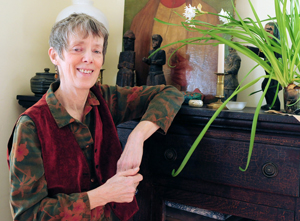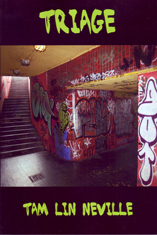
Tam Lin Neville lives and writes in Somerville, MA. Journey Cake, her previous poetry collection, was published by
BkMk Press (University of Missouri, Kansas City). She has received a Somerville Arts Council grant. Her poems have appeared
in Harvard Review, Mademoiselle, American Poetry Review, Ironwood and Sulfur, among others. With her husband, Bert Stern,
she co-edits Off The Grid Press, a press for poets over sixty. She also works for
Changing Lives Through Literature, an alternative sentencing program.
Discuss your new book Triage, published by Červená Barva Press.
What was your process for the book?
Many of the poems in Triage are about down-and-out people. This underserved population came into my life when I moved to
Boston eleven years ago. I was not financially in trouble but I was new to Boston. Much as I wanted to be here, it was a
difficult landing, and I spent a lot of time walking the streets. This book was prompted by what I found there - a huge
idleness, many people just sitting or standing, doing nothing, a tide of human waste washed up on the shore and, basically,
left for dead.
I can't imagine conceiving of the idea for a book of poetry and then setting out to write it.
With Triage, my process was the opposite.
After I moved to Somerville and had been writing for about five years,
I noticed that many of my poems where about street people. The subject had arisen naturally because of what I saw around me.
I've always been a poet interested in my own neighborhood, my own local and a good many of the poems in the book take place in
or near Union Square in Somerville.
The word "triage" is an interesting one. Initially I fell in love the sound of the word itself. I wrote a poem just
about just that, titled Triage. In the end I did not include the poem in this collection because it didn't seemed to fit.
But I took its title for my book.
"Triage" means "to sort." Most often this word is used in military
settings where resources are limited. "On a battlefield, for example,
the word triage means attending to the most severely wounded, those who have the best chance of survival. The goal is to save
as many as possible. Others may have to die unattended." (from Mountains Upon Mountains by Tracy Kidder). In a way, my book is
about who is sorted out in our society, who is left for dead - the homeless and other marginalized people. Unlike the battle
situation, here the irony is that those who need attention most are the last to get it. For me, the word "triage" includes a
sense of a social hierarchy. Who does the sorting? Who is included, excluded?
When I had about half of the poems for this book, I had a title and I knew, roughly, what its theme was. In putting together
my first book, Journey Cake, the process was exactly the opposite. I had enough poems for a book but I had no idea what
the unifying theme was. It took me several years to figure this out.
Describe your writing process.
My writing process is very bound up with early morning hours. I like to get up at 6 or 7, before my husband gets up and before
the traffic really starts moving, when people start going to work at 8:30. I've never been a late night person but many writers
I talk to say their most creative hours are when everyone else is asleep, be it early morning or late night.
Early in the morning, I feel fresh and have a sense of stolen time. My mind's usual "tapes" haven't started up yet. I often sit
in the same place in my living room, a chair I call the "wisdom seat" because much has come from my meditations in that spot.
Sometimes, later in the morning I will take this early draft with me to the main Somerville library. This building has a wonderful
3rd floor balcony with carrels that overlook the city. I always go to the same carrel, one that faces south. This gets me away from
the domestic distractions of home that have a strong pull on me.
Sometimes, to prime the pump when I first get up, I will read for 15 - 20 minutes. Right now I'm reading a wonderful book of poems
by Nora Pollard called Death and Rapture in the Animal Kingdom. Her sympathies are also with the underdog. She is a writer who
pushes against the boundaries but she does it in a natural way, without seeming reckless or crazy. She shares my own preference
for prose rhythms in poetry. But sometimes I need to shake myself up and read someone who style is completely different from my
own like William Carlos Williams or Anna Akhmatova. Sometimes I like to read a book of really demanding prose, criticism or
something like Kierkegard's Purity of Heart is to Will One Thing. Reading involves me in a conversation. When it's a good one
I want to become part of that conversation.
I should also say a word about the role of my body in writing. I think of writing, especially poetry, as a metabolic process.
When I set out to write I like to have a feeling of fitness, of physical readiness. For this I go to the gym. I also do a fair
amount of walking. In Triage you will see many poems prompted by walking. A friend of mine said walking is almost like thinking
in my book.
What are you writing/reading now?
I'm currently working on a manuscript of poems, 25 pages, just the right length for a chapbook.
These poems are all in the voice of a fictitious detainee being held at Guantanamo without charge.
I have given him the name "Hasan" and in the course of writing these poems a sort of biography has arisen,
not spelled out directly but alluded to in the poems. I was helped in this by reading several prison narratives,
especially Prisoner Without a Name, Cell Without a Number, by Jacobo Timmerman and Five years of my Life: An Innocent Man in Guantanamo
by Murat Jurnaz. These books gave me many details that helped to make the poems more real.
In general I would say my writing life is very bound up with my reading life.
Triage by Tam Lin Neville

Tam Lin Neville’s new book, Triage, reminds us that our cherished notions of
freedom, happiness and plenty actually conceal large communities of entrapment,
misery and poverty where many are simply left to die – triaged, if you will – in
front of our eyes. An observant neighbor, a journalist, and above all, a poet of
great skill and heart, Neville speaks for those who cannot speak for themselves.
Few poets writing today have the patience and talent to guide us toward such a
civilizing compassion.
—Roger Mitchell
Behind this remarkable book is a mind that has long contemplated the humanity
of those she meets every day – neighbor, stranger, friend. Yet she speaks from a
respectful distance and this enables her to write poems with no self-interest, only
clear sight and generosity. Her language is spare, stripped of all aesthetic preening,
creating a poetry that is both accurate and visionary.
—Betsy Sholl
Triage is a tough, uncompromising book, but one that’s also big-hearted, despite
the sorrow so evident in the title and in many of the individual poems. Written
with great economy and precision, the lyric here is not merely a display of skill,
but a form of wisdom literature, a site map to help us navigate these difficult times.
I hear the voices of Dickinson and Niedecker – stern mentors, indeed. In Neville’s
poems their legacies are gracefully and fearlessly served.
—David Wojahn
$15.00 | ISBN: 978-0-9844732-3-6 | 51 Pages | In Stock

|

